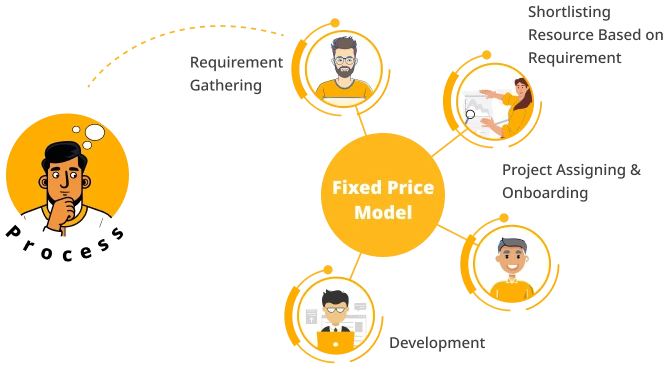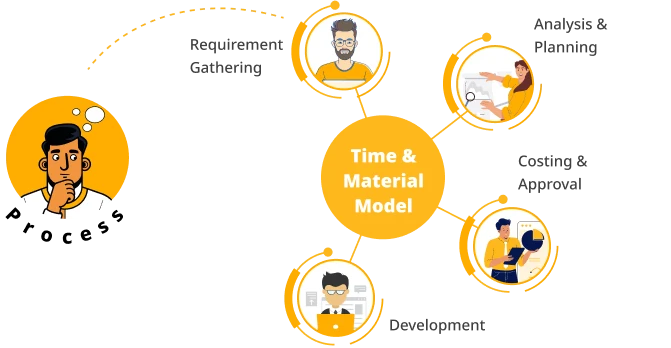AI Solutions Built for Scale, Speed & Efficiency
From intelligent automation to enterprise-grade AI applications, we help you streamline operations, accelerate growth, and stay ahead of the competition.

Professional, reliable, and results-driven – they delivered exactly what we needed, on time and within budget.
- James
From conceptualizing your AI solutions to crafting them in real time, our AI developers build robust software to help you make smart decisions and lead your business to success.
We build powerful AI solutions that optimize operations and accelerate growth.
We integrate AI systems seamlessly while engineering scalable MCP-based architectures.
We identify high-impact AI opportunities and define a clear adoption roadmap.
We manage, optimize, and support AI systems for long-term success.
We create smart, adaptive mobile apps with AI-driven features.
Provide seamless business operations by automating your systems
We leverage AI technologies and tools to build powerful digital content.
Our custom software analyze images and videos with advanced computer vision.
Help build intelligent AI agents that think, act and evolve.
Our consultants guide you from ideation to deployment, ensuring a clear AI roadmap.

As a top AI development company in India, ValueCoders specializes in delivering outstanding solutions and experiences in data analytics.
Our artificial intelligence development services are tailored to your business needs, driving efficiency and discovering new possibilities. Partner with us to ensure your business’s success and harness the power of AI.
Our team builds bespoke AI applications aligned with your specific business objectives.
Partnering with businesses in diverse sectors to unlock new avenues for growth and innovation.
We efficiently execute AI solutions from inception to deployment with our streamlined delivery process.
We offer in-depth analysis of client requirements and project objectives.
Our experts meticulously explore and prepare data for AI model development.
Our expert team then builds a tailored AI solution design that aligns with client needs.
Our team builds and refines AI models using cutting-edge techniques.
We integrate AI solutions into client systems and ensure smooth deployment.
We provide ongoing support and updates, ensuring optimal performance post-deployment.
Choose from our flexible hiring models designed to fit your needs and budget.
For businesses with well-defined project scope and requirements.

For businesses with long-term project requirements or complex development process. They get more control of the process.

For businesses looking to pay for completed project instead of committing to fixed project cost.

AI development can be complex. We break down the essential steps, from data preparation to deployment, making it easier for you to understand the process of developing AI solutions. Here’re the practices that some of the best custom AI development companies follow to create scalable and effective AI applications.

Automation and Job Transformation
AI is revolutionizing industries by efficiently handling repetitive tasks.
Improved Efficiency and Productivity
AI technologies are transforming how businesses operate and allocate resources.
Personalization and Customization
AI delivers tailored experiences by analyzing user behavior patterns.
Advancements in Healthcare
AI is reshaping medical care through improved diagnostics and treatment planning.
Improved Safety and Security
AI enhances protection systems in both physical and digital environments.
These impacts demonstrate how AI is becoming essential for solving complex problems and improving the quality of life across different sectors worldwide.
AI and ML are closely linked to each other but also have a few differences. Let’s look at them:
Artificial Intelligence is a broader field of creating systems that act like humans. It covers a wide range of techniques and approaches that help machines perform tasks that earlier required humans. It includes:
AI uses a wide range of techniques, whereas, ML provides means to automatically learn and improve data.
On the other hand, ML or Machine Learning is a subset of AI. It focuses on training machines in a manner so that they can make predictions or decisions without using programming skills.
ML includes:algorithm development and models that can read data patterns and insights. The algorithms of ML reads historical data and identifies patterns to use them for making predictions and take decisions.
Machine Learning algorithms recognize patterns and makes predictions accordingly. It can be trained using vast amount of data to improve performance over the span of time.
You can also refer to our blog post to integrating AI and machine learning into business operations.

Due to the easy accessibility of these tools, there is a higher chance of misconduct. Therefore, various ethical AI usage guidelines have been promoted. Let’s have a closer look at some of them:
1. General Data Protection Regulation or GDPR
Initially implemented in the EU, the GDPR governs the collection, processing, and storage of personal data. It includes protection for AI systems that process users’ personal data. GDPR guidelines focus on individuals’ rights, transparency, and permission.
2. Ethical Guidelines for Trustworthy AI
The European Commission has offered guidelines for creating and deploying trustworthy AI. This covers human agency and oversight principles, technical reliability, privacy, transparency, and accountability.
3. AI Principles by Global Organizations
Organizations all around the world have developed AI principles and guidelines, including the Organization for Economic Cooperation and Development and the United Nations.
These frameworks stress aspects like human rights preservation, fairness promotion, transparency enhancement, and accountability in AI service provision and deployment.
4. AI Ethics Guidelines by Industry Associations
Industry associations like the Institute of Electrical and Electronics Engineers and AI Partnership have released guidelines and best practices for the ethical use of AI. Recommended practices concerning AI.
These guidelines revolve around themes such as transparency promotion, fairness assurance, accountability reinforcement, and ensuring welfare.
Apart from the guidelines above, there are some ethical AI usage guidelines depending on specific industries. For example, regulations like HIPAA in the United States highlight the secure and ethical use of AI in the healthcare sector.

Integrating AI into your business is a strategic move, but it comes with important financial considerations.

Your approach to implementing AI serves as your roadmap to success.
Adopting AI development services is transforming industries and reshaping how businesses operate. From predictive maintenance to personalized customer support, AI development companies help revolutionize processes and drive efficiency across various sectors.
Let’s look at six ways AI is making a difference:
1. Predictive Maintenance
Machines now tell us when they need fixing. Smart AI. It spots problems early by watching how machines work. This saves money. Companies avoid surprise breakdowns and keep working without stops.
2. Customer Churn Prediction
Keeping customers matters. AI helps with this. It looks at data to find which customers might leave soon. Companies can then take action. They can fix problems before customers decide to go elsewhere.
3. Sales Forecasting
Knowing future sales helps businesses plan better. AI makes this easier. It looks at past sales and market trends to predict what’s coming. Better planning follows. Companies order the right amount of products and hire the right number of people.
4. Healthcare Diagnostics
AI saves lives. That’s powerful. It looks at medical images to find diseases early, sometimes before doctors can spot them. Patients get help sooner. Early treatment often means better outcomes for serious conditions.
5. Customer Support Chatbots
Wait times are frustrating. AI fixes this. Chatbots answer questions right away, any time of day. They handle simple problems. This frees up people. Human agents can focus on solving more complex issues that need a personal touch.
6. Predictive Analytics in Finance
Banks use AI to identify issues, and it works well and takes no time. The technology can find unusual patterns that might be fraud before money is lost. It also helps predict market changes.
The evolution of AI brings endless possibilities to businesses of all sizes. It does more than save money. It changes how companies work and compete. The future belongs to those who adapt to change.
One of our blog posts, “Navigating The World Of AI Development: Opportunities & Challenges,” discusses the numerous opportunities of AI development in detail.
AI is no longer an experimental technology; it has become an operational necessity for enterprises seeking efficiency, scale, and consistent customer experiences.
Modern artificial intelligence solutions help businesses automate processes, reduce manual dependencies, and enable smarter decision-making across the entire workflow chain.
1. Streamlining Operations with Automation
Organizations deal with repetitive, manual tasks that consume time and create operational friction. AI eliminates this by automating:
This not only saves time but reduces errors and improves reliability.
2. Smarter Decision-Making Through Predictive Insights
AI helps businesses move from reactive decisions to proactive strategies:
With predictive intelligence, leadership teams gain visibility and clarity into future outcomes.
3. Enhanced Customer Experience Across Channels
AI enables personalized experiences at scale by analyzing behavior, intent, sentiment, and preferences. This leads to:
4. Unlocking New Revenue Opportunities
By using AI to analyze customer needs and market trends, companies can introduce new product lines, optimize pricing, or cross-sell intelligently.
5. Future-Proofing Business Models
AI gives enterprises the flexibility to adapt, innovate, and stay ahead in a competitive landscape.
Building AI internally requires high costs, specialized talent, and significant infrastructure. This is why partnering with an experienced artificial intelligence services company is usually more efficient and scalable for growing businesses.
A capable AI service company accelerates development, avoids common pitfalls, and ensures long-term maintainability of AI systems.
1. When Your Use Case Requires Deep Expertise
AI projects involving computer vision, NLP, predictive modeling, or automation require niche skill sets. A mature AI services provider brings ready talent, frameworks, and tools, reducing experiment time.
2. When Speed-to-Market Matters
Internal AI teams take months to recruit and set up. AI companies provide:
This reduces launch time significantly.
3. When Existing Systems Need Complex Integrations
Most businesses already use ERPs, CRMs, data warehouses, or legacy applications. AI partners bring integration experience that prevents:
4. When You Want Predictable Costs
Hiring internal AI engineers is expensive. Outsourced AI delivery helps control budgets with monthly or project-based pricing.
5. When Your AI Strategy Needs Long-Term Optimization
AI models degrade over time. Specialized companies ensure:
Partnering ensures long-term reliability and measurable business ROI.
AI has become a central pillar of digital transformation. Working with an experienced artificial intelligence solutions provider helps organizations create systems that improve customer satisfaction, operational efficiency, and revenue outcomes.
A capable artificial intelligence solutions company ensures that AI integrates seamlessly across functions – sales, support, operations, finance, HR, and product.
1. Customer Experience Transformation
AI-driven personalization increases engagement, loyalty, and revenue.
These enhancements deliver predictable improvements in conversions and customer satisfaction.
2. Operational Optimization at Scale
AI reduces overhead, manual effort, and delays by automating:
This is where working with skilled artificial intelligence services providers becomes essential.
3. Data-Driven Decisions With Predictive Intelligence
AI analyzes trends, anomalies, and behavioral patterns to provide actionable insights:
4. Revenue Growth Through Intelligent Automation
AI uncovers new revenue streams by identifying hidden patterns in customer behavior and market demand.
5. Enterprise-Wide Scalability
Custom artificial intelligence business solutions ensure the system scales with your data, users, and infrastructure – enabling long-term AI adoption without disruption.
Here are answers to some questions our clients mostly have in their minds.
Ans. You can choose ValueCoders as your AI deveopment company in India for the following reasons:
When you choose ValueCoders, you get a trusted partner for your project that delivers innovative AI automation solutions to take your business forward.
Ans. Yes, as a leading AI app development company, we have expertise in integrating custom AI solutions into existing systems. Our team uses the best tools and technologies to provide tailored solutions meeting specific project needs.
Ans. Depending on customer needs, the development and deployment timeline for an AI solution can vary depending upon various factors such as:
However, depending on the project’s needs, it may take several weeks to months.
Ans. To ensure the security and privacy for AI development, we follow:
Ans. The best AI type depends on your app’s specific requirements. Options include machine learning for predictive tasks, natural language processing for text analysis, computer vision for image recognition, or a combination tailored to your needs.
Ans. The amount of data needed varies based on complexity and the AI type. Generally, more data improves accuracy. We assess your project to determine the optimal dataset size for effective training.
Ans. Our process involves the seamless integration of AI models into your app architecture, ensuring compatibility and functionality. We follow industry best practices to deploy and scale AI solutions effectively.
Ans. We prioritize rigorous testing and validation throughout development. Our experts employ quality assurance measures, ethical guidelines, and ongoing monitoring to ensure accuracy, reliability, and ethical compliance of AI models.
We are grateful for our clients’ trust in us, and we take great pride in delivering quality solutions that exceed their expectations. Here is what some of them have to say about us:

Co-founder, Miracle Choice

Executive Director

Director

Director
Trusted by Startups and Fortune 500 companies
We can handle projects of all complexities.
Startups to Fortune 500, we have worked with all.
Top 1% industry talent to ensure your digital success.



Let's discuss how we can bring your vision to life.